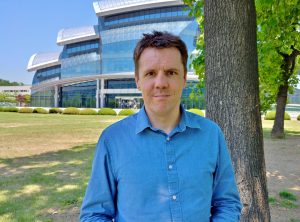Justin is part-time distance learning student studying on the department’s MSc Applied Linguistics for Language Teaching programme. Justin is also a Head Teacher within an ESL department at an overseas University, which he does full-time along side his studies.
How do you juggle your studies with a full-time job?
I can’t pretend that juggling a full time job, studies, and in my case a couple of children, is easy, or that it doesn’t involve late nights poring over a computer, but it can be done. By timetabling study hours, and by squeezing some shorter study tasks into work breaks, it can be accomplished. It’s also further motivation to get the children to sleep at a sensible time, freeing up the evenings for study!
How does the programme support and engage you as a distance learning student?
It’s been said that distance learners get more attention in terms of time. While we can’t have face-to-face conversations with our tutors or peers as easily as residential students can, and we can’t completely replicate typical classroom dynamics, the tutors devote a lot of time to commenting on our work, and stimulating further discussion, while many peers do similarly. The time given to reading and commenting on our work, and the discussion of each student’s submissions are often therefore far lengthier than in a traditional classroom. Outside the virtual learning environment, the library staff are aware of distance learners’ disadvantages in terms of physical access to the library, so they are very supportive when we make a special request. The net effect is that other than missing out on non-academic aspects of Oxford life, studying by distance has not been a disadvantage.
What are the advantages to being a distance learning student?
Studying applied linguistics by distance while employed, teaching a second language has given my cohort several great advantages. We have been able to try what we have learnt directly in the classroom to see whether we think the theory works in practice, and we have brought practical knowledge to our discussions. Furthermore, there is often a gulf between theorists and practitioners, so it has been enlightening to study with other practicing theorists. We have at times been able to use our varied perspectives to bridge this theory-practice division.
Another advantage to studying by distance while employed as a teacher has been that many of my students have helped me greatly by participating in the research for my dissertation. I am indebted to them, and I appreciate the relative ease with which I have been able to recruit participants.
What’s been your favourite thing about the course to date?
This course demands a lot of students, and it gives a lot in return. The course is as rewarding as it is challenging, and the experiences of both the difficulties and rewards have been enlightening. The learning community of my cohort (and indeed of preceding and following cohorts) has provided invaluable support, and through this environment I have learnt a great deal about how I learn, and thus how I may help others to learn.
What do you most value about the teaching at the department?
Through studying here, I’ve seen first-hand the value of guided self-directed learning in a supportively critical community of peers. While considering how to teach, I have learnt how to learn, and I hope I am able to replicate this experience in some way for my own students.
Why do you think it’s important to study education?
Who among us cannot recall a teacher who has influenced our growth? It is a tremendous privilege to be in a position to return the favour, but it is also a great responsibility, so I encourage everyone to develop as more effective teachers, for whether in official capacities, as parents, or otherwise, we are all teachers in some way.
What has your degree taught you most?
Through my course, I have developed greatly as a critical thinker and as a researcher.
How will you utilise your degree in the real-world once you’ve completed?
I hope to further my studies for my own self-development, to research second language acquisition as a practising teacher-researcher to advance knowledge in our field, and to tailor university programmes to learners’ needs so that what the research community finds may have practical implications, enhancing others’ learning experience.

